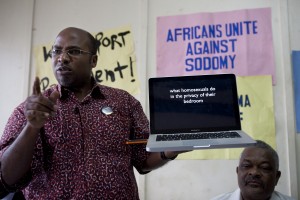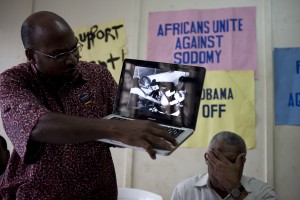In a “Where We Stand” editorial, Christianity Today urged readers to “Listen, then Speak.”
Overall, I am disappointed and puzzled by the editorial. The closest the writer gets to telling us where CT stands is near the end of the article:
We join many other American voices in our concern over the way the proposed legislation can hamper ministry and harm children of God. But we are also grateful for the African voices who are calling us to pay attention to how Western society may be undermining our own zeal for preserving God’s gift of sexuality.
I am unclear how the Ugandans are calling us to see sexuality God’s way when they swallow the camel of polygamy and strain at the gnat of homosexuality. Perhaps this way of ending the article seemed balanced to the writer; give a little here, take a little there, but I am unclear what the writer thinks we can learn from the Anti-Homosexuality Bill.
To get to the conclusion, the article meanders through some thoughts on cultural relativism, pointing out some conflicting possible reactions from Western Christians.
Now Uganda’s proposed Anti-Homosexuality Bill has put Western Christian leaders in a bind:
(1) The leaders’ commitment to human rights (based on the Golden Rule and the image of God) leads them to oppose harsh penalties for consensual adult homosexual activity; (2) their belief in the traditional family leads them to support Ugandan Christian resistance to sexual liberation movements imported from the United States and Europe; (3) their belief that churches need to minister to homosexuals leads them to oppose legal penalties for those who don’t report homosexual activity; (4) their belief that the fight against HIV/AIDS requires confidential testing leads them to oppose laws that could expose HIV-positive people to harsh penalties; (5) their belief in the ability of African churches to make mature decisions prompts them to remain silent on legislation that African churches are still pondering; (6) their commitment to ongoing engagement in missions and social service with African churches makes them extremely cautious to interfere in general.
I suspect these possible reactions do seem confusing for many evangelicals. However, it is clearly possible to respect the Ugandan’s right of self-determination while at the same time, disagreeing with the proposal before their Parliament. I also take issue with what is listed as the first possible response and would say it this way:
The leaders’ commitment to human rights (based on the Golden Rule and the image of God) leads them to oppose harsh any penalties for consensual adult homosexual activity.
Responding to the Ugandan bill, I believe Rick Warren had it absolutely correct when he wrote about criminalization of homosexuality:
I oppose the criminalization of homosexuality. The freedom to make moral choices is endowed by God. Since God gives us that freedom, we must protect it for all, even when we disagree with their choices.
We know where Rick Warren stands. Where does CT stand on criminalization? To me, it is not clear.
The editorial continues:
For American Christian leaders, both silence and open condemnation end up violating important missional and human-rights principles. There is no escaping this dilemma, but several points are worth reflection.
What missional and human rights principles? I don’t think it is difficult to say that the sentence of a life time in jail for touching “another person with the intention of committing the act of homosexuality” is wrong. What missional or human rights’s principles are violated by saying what Rick Warren said to his Ugandan brothers and sisters?
Then adding insult to injury, the CT writer uncritically invokes Scott Lively’s reckless charge of racism toward those who found fault with the Americans who spoke at the March anti-gay conference in Kampala.
First, when American media reported on the proposed legislation, they assumed an inordinate amount of American influence. Media outlets tried to “expose” the power of American evangelicals who had spoken about gay issues in Uganda. Such assumptions were racist, said Scott Lively, one of the speakers. If anything, Ugandan legislators did not follow his advice: He had urged them to favor rehabilitation rather than imprisonment in crafting a new law on homosexuality.
If I understand CT here, I think this is more a criticism of the reporting by American media than a vindication of the March, 2009 ex-gay conference in Uganda. However, as presented, that distinction is vague. One could interpret this paragraph as agreement with Scott Lively’s charge of racism, obfuscating the Americans’ responsibility for what was presented at the conference. This, of course, is offensive and fails to confront the substance of Scott Lively’s remarks to the 10,000 or so people he claims to have addressed. Yes, Lively advised rehabilitation (as if that is an enlightened option) in the context of continued criminalization, but in no particular order, he also said that
- Nazi atrocities were animated by homosexuality,
- amoral homosexuals were probably responsible for the Rwandan holocaust, and
- homosexuals prey on vulnerable children.
Hearing this, it is not a surprise that the Ugandans did not heed his call for rehabilitation. Nor is it a surprise that Christians are horrified that such slander was presented in the name of Christ.
CT’s advice is much less specific:
We counsel patience as Ugandan leaders sort out among themselves the best way to preserve their culture’s sexual mores. We also caution them against punitive strategies, as we believe that capital punishment for homosexual behavior goes well beyond the limit.
The reference to capital punishment is pretty safe since even proponents of the bill suggested the removal of the death penalty in December, 2009. However, is life in prison a “punitive strategy?” What is the limit? I think it is, but from this article, I cannot tell where CT stands.
I know where I stand.

